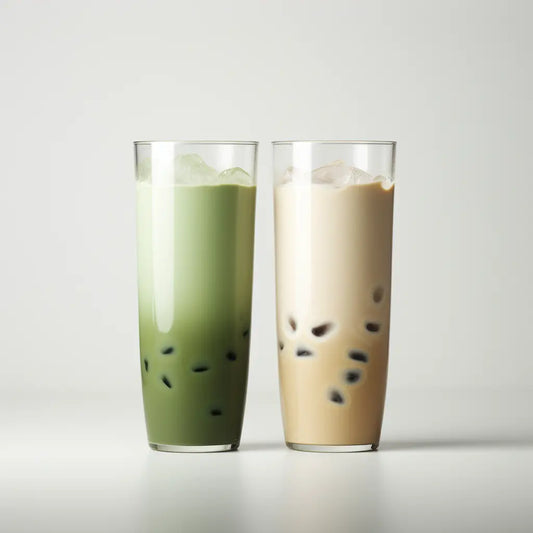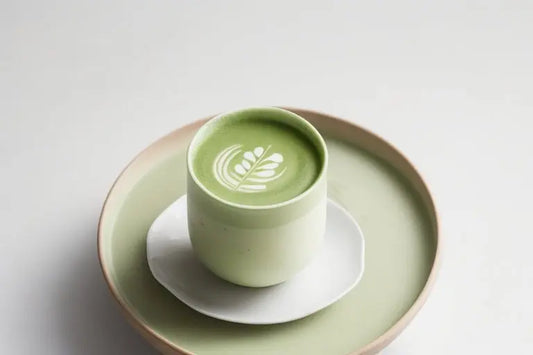Table of Contents
- Introduction
- Caffeine in Our Lives
- A Tale as Old as Time: The History of Caffeine
- The Science of Caffeine
- The Beauty of Coffee
- The Rich Aroma: Understanding Coffee
- The Caffeine Content of Coffee
- Traditional Matcha: A Delightful Alternative
- Demystifying Matcha
- How Much Caffeine is in Matcha?
- The Comparison Begins: Coffee vs. Matcha
- Health Effects: The Good and The Bad
- Making The Switch: From Coffee to Matcha
- Personalizing Your Experience
- Conclusion: Your Choice, Your Adventure
- Frequently Asked Questions
Introduction
In the world we live in, caffeine is a godsend. A beacon of hope in our morning routine, an afternoon pick-me-up, a partner in crime during those late-night work sessions — we can't deny its power over us. But did you ever stop to wonder about the battle raging in your teacup, where coffee takes on the challenger, matcha?
"Ding Ding Ding!" It's the showdown you never knew you needed: Coffee vs. Matcha! A caffeine battle royale. It's not just about the caffeine content. This match goes much deeper than that.
Caffeine in Our Lives
A Tale as Old as Time: The History of Caffeine
Caffeine is more than just a chemical compound. It's an integral part of cultures worldwide. Discovered in Ethiopia, coffee became a beloved beverage throughout the Middle East, while matcha was revered in traditional Japanese tea ceremonies. But, what's the magic behind this bitter white crystalline xanthine alkaloid?
The Science of Caffeine
Let's dive into how caffeine works. Known as an adenosine receptor antagonist, caffeine alters our perception of tiredness by blocking adenosine. It induces a sense of alertness, improves mood, increases heart rate, and even enhances athletic performance.
The Beauty of Coffee
The Rich Aroma: Understanding Coffee
Coffee is an aromatic brew savored by many worldwide. Its unique taste stems from the robusta or arabica beans at its heart. This concoction, steeped richly in tradition and culture, has become an essential commodity, but what does it bring to the table in caffeine content?
The Caffeine Content of Coffee
With about 95mg of caffeine per 8-ounce cup, coffee is quite the heavyweight in this face-off. However, it's a tale of two coffees, as the caffeine content can shift based on the brewing method and bean type. For the caffeine enthusiasts, beware; the java jackal packs quite the punch!
Traditional Matcha: A Delightful Alternative
Demystifying Matcha
Moving eastward, we meet matcha. For those who are hearing this term for the first time, it might seem alien. However, it's a cornerstone of Japanese culture. Made from ground green tea leaves, matcha presents a unique, vibrant flavor - slightly sweet, slightly bitter.
How Much Caffeine is in Matcha?
The caffeine level in matcha is lower than in coffee, with around 70mg per serving. However, the "buzz" from matcha is often described as a calm alertness, lacking the jittery sensation coffee can produce. This slower release of caffeine is due to the presence of L-theanine, which induces relaxation without drowsiness.
The Comparison Begins: Coffee vs. Matcha
So far, in the caffeine showdown, coffee seems to be the heavyweight champ. However, matcha isn't down for the count just yet. It's vital to remember that caffeine isn't the only deciding factor. We've seen benefits from both sides, with coffee's powerful stimulation and matcha's tranquil energy.
Health Effects: The Good and The Bad
While coffee is a worthy source of antioxidants, it's known to cause restlessness, upset stomachs, and insomnia. On the other hand, matcha has unique catechins, a type of antioxidant linked to fighting cancer, viruses, and heart disease. It's also renowned for reducing stress and boosting metabolism.
Making The Switch: From Coffee to Matcha
The idea of shifting from coffee to matcha might seem monumentally difficult. If that's what you're thinking, know that baby steps will get you there, too. Starting with a matcha latte or adding a dash of coffee to your matcha can introduce you to new flavors without shocking your taste buds.
Personalizing Your Experience
We understand that everyone's needs differ, so it's imperative to consider your lifestyle, dietary restrictions, and personal tastes when choosing your winner in the coffee vs. matcha debate. Maybe it's about more caffeine? Then coffee is your pick. However, if you need an anxiety-free energy source, then matcha beckons.
Conclusion: Your Choice, Your Adventure
At the end of the day, coffee and matcha both offer captivating tales of flavors, traditions, and health benefits. So, who wins the caffeine showdown? You do! The joy is in the adventure, the exploration of tastes, and finding the perfect drink that energizes, satisfies, and comforts you.
Frequently Asked Questions
-
Q: How does caffeine affect our bodies?
A: Caffeine blocks adenosine receptors in the brain, which in turn reduces tiredness, enhances mood, and increases alertness. -
Q: How much caffeine is in coffee and matcha?
A: An average cup of coffee contains around 95mg of caffeine, while a serving of matcha contains about 70mg. -
Q: Can matcha replace coffee?
A: Absolutely! If you favor a stable, smooth energy boost without jitters, matcha is an excellent choice. -
Q: Is the caffeine in matcha healthier than coffee?
A: Not necessarily healthier, but the caffeine in matcha is known to release slowly, providing a feeling of calm alertness. -
Q: If I’m giving up coffee for matcha, any tips?
A: Take it slow. Try matcha lattes or adding a bit of coffee to your matcha at first to ease the transition. -
Q: Is caffeine harmful?
A: Caffeine, when consumed in moderation, is safe for most people. However, it can cause headaches, insomnia, and irregular heartbeat, especially in high doses. -
Q: Which has more health benefits, coffee or matcha?
A: While both have antioxidants, matcha has unique catechins linked to fighting cancer, viruses, and heart disease. It also helps reduce stress and boost metabolism. -
Q: Can I drink coffee and matcha in a day?
A: Sure! If you want to enjoy both, switch the times you consume each to manage the caffeine intake. For instance, have matcha in the morning and coffee in the afternoon or vice versa.



